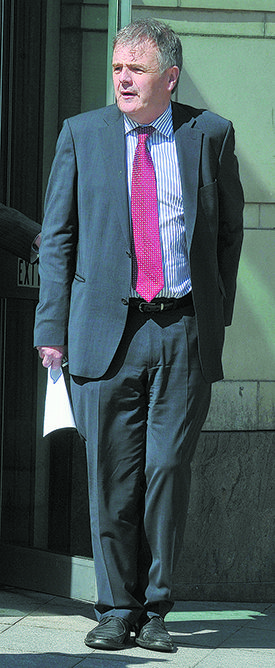Downpatrick GP in custody awaiting sentence
Downpatrick GP in custody awaiting sentence

A DOWNPATRICK GP has been remanded in custody after the first prosecution of its kind in the UK.
Dr Hugh McGoldrick will be behind bars until next Friday, awaiting sentencing for falsifying a clinical trial involving 10 of his patients.
The 59 year-old doctor, who formally retired from practice earlier this month after working in Downpatrick for over 30 years, had previously admitted improperly conducting the trial of anti-insomnia medication in 2007 and 2008.
Downpatrick Crown Court today heard details of how he recruited 10, mostly elderly, patients to the study, which involved over 1800 people worldwide.
The first stage of the clinical trial required the patients to submit a daily sleep diary through a dedicated phone line to determine if they were suitable candidates.
McGoldrick admitted falsifying such records for his patients who he claimed were reluctant to use the telephone system themselves.
When directly asked by Judge Piers Grant if McGoldrick had made up the responses he submitted to the phone line, defence barrister Frank O’Donoghue QC said; “That is right, that is what he had pleaded to and has accepted.”
Prosecutor David McDowell QC told the court that if the patients had gone through the correct screening process they would probably have been excluded from the study.
He described it as “remarkable” that McGoldrick’s entire cohort was deemed suitable for the study, in comparison with around 53 per cent of other trial groups.
“All 10 patients were probably ineligible,” he said.
This was, he explained, for a number of reasons including the fact that several participants were too heavy to take part, had pre-existing medical conditions that would disqualify them from the study or were taking medication that would interfere with their natural sleep pattern and would therefore make them unsuitable.
Pleading for leniency, Mr O’Donoghue said the defendant, who had a previously clear record, had behaved “out of character” during the clinical trial, which was one of 24 such trials he had undertaken between 2004 and 2008.
If he had made early admissions about the irregularities of his trial, Mr O’Donoghue said, McGoldrick may have avoided criminal proceedings “and the total erosion of reputation that has gone with this.”
“He has lost his career, he has lost his reputation, he has had to deal with the publicity and the speculation of the community about the extent of his wrongdoing,” he said.
Mr O’Donoghue emphasised that the defendant did not undertake the clinical trial, which the court heard would have been worth over £20,000 upon completion, for financial gain.
He said outstanding monies from the trial, of around £9,200, had now been lodged with McGoldrick’s legal team for repayment.


